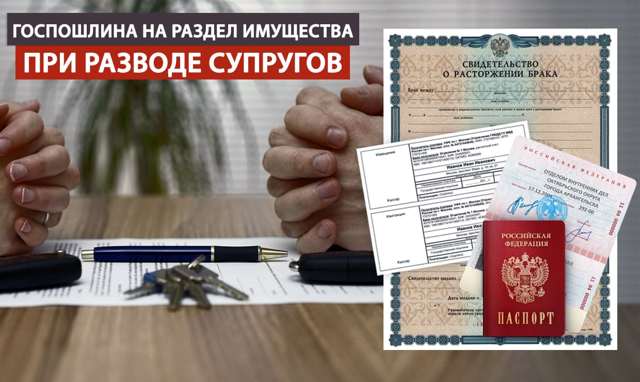26.07.2018 
When a court intervenes in the division of property between the owners of the divorce, a fee must be paid, i.e. the government service, only upon the submission of the payment receipt and the provision of the necessary documents, the court will be in dispute with a third party. Before proceeding to the court, the amount to be paid must be calculated in the correct order, a package of accompanying documents must be prepared. How do we do so correctly and quickly?
Budgeting for property disputes

The ideal way to deal with property rights is to have a marriage contract with a divorced couple, and in this way many protect themselves from disputes and conflicts after the end of a family life.
- Documented consent of the future couple to the distribution of a property;
- The rights and obligations of future spouses in the event of divorce;
- as and when each of the parties may obtain property that is expected by agreement.
However, it is not always the case that citizens who enter into marriage view its dissolution in a far-sighted manner, and it is unlikely that anyone will take such a serious step in thinking about the worst.
It is the division of property in divorce that triggers many disputes and problems between former spouses.
Without the intervention of a third party, the judiciary, at times, does not cost any such activity, which leads to a mandatory payment of the State's budget.
In some cases, the State is of a fixed importance, but when there is a need for the court to take part in the settlement of property disputes in divorce, it will have to be paid on the basis of the cost of the claim. In our case, the plaintiff will have to pay the following fees:
- Six hundred and fifty roubles in separate receipts are paid for the dissolution of a marriage;
- An amount directly dependent on the price of the statement of claim is calculated for the item of property;
- In the event of an appeal by one of the parties against a decision taken by the court, an additional State order of one hundred and fifty roubles shall be paid;
- If, in addition to the separation of the property, it is necessary to determine each party ' s share of the property, an additional 300 roubles shall be transferred to the budget.
Depending on the situation, more or less money will have to be spent; the most expensive is the direct action against the division; it is calculated easily enough.
Computation of the State party ' s claim

Before filing a complaint with the court, it is necessary to determine the valuation of the property contained in the application, and the plaintiff himself calculates the price, while the Civil Code provides for the valuation not only of Russian rubles but also of foreign currency, which depends on the price characteristics of the property in question.
A number of errors should be avoided in the calculation:
- Claims for material or moral damage cannot be included in the price of the claim;
- On the basis of the division of property between former divorced spouses, it must be borne in mind that each person is entitled by law to only half of the jointly acquired property.
What is implied in the last paragraph is that what the spouses have acquired in a formal relationship is accepted by the court as joint property.
- A variety of monetary income (wages, pension payments, deposits, deposits);
- Shares and other securities;
- Income derived from business as well as from intellectual work (writing of articles, books, etc.);
- Housing and non-residential property;
- Various modes of transport;
- precious metals and jewellery.
It doesn't matter whose income the property was acquired into ownership. Anything obtained between the marriage and the dissolution of the marriage is divided into equal parts between the spouses. The exception may be gifts, personal effects, and property acquired under the right of inheritance. We need to evaluate the property in question.
Assessment of property prior to separation in divorce

The procedure can be carried out on its own, but it is often necessary to use the services of specialists, and it is often not always easy to assess the reality of an item, especially in terms of the view of high-value property. Qualified professionals may be involved in the following circumstances:
- Forced to do so on the recommendation of the court;
- If it is necessary to divide property in strictly equal shares;
- Clarifying the exact value of the property on the market for sale if it does not wish to be divided;
- The determination of the amount to be paid as compensation in the division of one of the parties.
The organizations or individuals involved in the evaluation shall conduct it on the basis of the following possibilities: first, property shall be evaluated visually in the immediate presence of the evaluator.
Secondly, the parties to the conflict may hand over documents confirming the purchase — a contract and other documentation that records the money spent on the property — after which experts conduct analyses.
But sometimes you have to combine these methods, for example, a divorce claim includes a car that was purchased a few years ago.
The value of the document is one, but in reality it is necessary to take into account the wear and tear as well as its appearance.
Therefore, valuationrs take into account not only the original cost but also the depreciation of the vehicle.
The cost of evaluation services depends on several factors:
- The more property is dealt with in the claim, the more money is transferred to the valuer for work;
- In different regions, the quantification of services is varied;
- The final calculation shall take into account the manner in which the procedure is conducted and the need to travel on site.
When we consider these costs, we must proceed to the immediate calculation of the state service, and we will determine how to make the payment itself and how to calculate the amount of the public service at the time of the division of property.
Where do you pay the government and how do you calculate it?

If there is a need to involve the court in the division of property, the State shall be paid in the budget, which shall be calculated in accordance with certain methods:
- If the value of the property in the claim is up to 20,000 rubles, four per cent of the budget is paid, but not less than 400 rubles per day;
- If the claim for division involves a property price of between 20,000 and 1 million rubles, the government is made up of a fixed payment of 800 rubles, to which three per cent of the sum is added;
- With an estimated asset of between one million and two million rubles of the Public Ministry, it consists of a fixed rate of three thousand two hundred rubles and two per cent of the total value of the claim;
- Up to 10 million rubles of the public service shall be calculated at a rate of 1 per cent, to which shall be added five thousand two hundred rubles;
- Finally, claims amounting to 10 million are heard by the court only after payment of the state order of 13,000 200 roubles and half a percentage of the total value of the property claim.
The upper bar of the fee should not exceed 60,000 rubles; a special calculator, presented on the website of the court where the charge is filed, may be used for more accurate counting; in the case of direct payment, the details of the money transfer may be specified on the same site or on a personal visit to the court.
If the payment is made through the bank – you have to specify the main requisitions, the rest will be filled in in a template according to the relevant ministry. A copy of the cheque or a paid receipt will be forwarded to the court along with the statement of claim. We need to find out a few questions about the government service itself.

In general, the payment of the State is made by the person who initiates the action, but the court often considers additional circumstances with regard to the payment:
- The claimant ' s party may seek compensation for the payment of the public service for its large amount;
- The court considers the material situation of both the plaintiff and the defendant;
- Either party may file a motion for deferment or even an exemption from payment of the public service.
With regard to the delay, the claimant must provide documentary evidence that it is not possible to pay the State party ' s fee.
A certificate from the employment centre, or a certificate of income from the employer, may provide such a certificate.
It is not uncommon, however, for the parties to be able to return the government service already paid to the budget in connection with the division of property in the event of a divorce.
The return options are different:
- Until the end of the trial or during the course of the trial, a decision was taken to reject the division of property;
- The court refused to consider the claim for an important reason;
- The division of property was terminated at the initiative of one of the parties;
- The amount paid in the form of a government service was miscalculated and amounts to more than necessary.
The application for one of the above-mentioned cases shall be submitted to the court, where the application for division has already been filed; the authority shall review the application and make the necessary decision, which shall enter into force no later than fifteen calendar days; and the return of the funds shall be made through the tax authority by means of a certificate from the court and the application filed.
Thus, we have received a fairly clear picture of the amounts paid to the budget when a court is engaged in proceedings between the former spouses. When the division of property is effected in the event of divorce, it is necessary to pay the Minister ' s Office, calculated in accordance with the law, and the confirmation, together with a package of accompanying documents, to be submitted to the court.
State for the division of property
The State is responsible for the division of the apartment in the event of a divorce.
1,452 views
Virtually every claim filed before a court is subject to the payment of a State duty, the amount of which is fixed by the Tax Code of the Russian Federation, and there is no exception to the claim for the division of the apartment between the spouses following the divorce, at which the plaintiff is obliged to calculate and pay the State duty.
This type of case is characterized by the very large size of the government since the value of real estate can reach several million, which is why special attention should be paid to the calculation of the state ' s property when making a claim for division of the apartment.
Dimensions of the Public Ministry
The procedure for calculating the State duty on claims of a property nature is set out in article 333.19 of the Code of Criminal Procedure.
When the property of the spouses is divided, the duty must be calculated in accordance with the rules set out in article 333.19, paragraph 1, of the Code of Criminal Procedure, i.e. as a property claim, and the amount of the State is directly dependent on the price of the claim, i.e. the value of the dwelling to be divided.
How is the majesty calculated?
The amount of the duty is to be calculated on the basis of the order of calculation set out in the above-mentioned article.
Let's give you a more detailed example of how to calculate the majesty.

The plaintiff filed a claim for the division of an apartment with a total value of 1.5 million roubles, and in the plaintiff ' s claim for ownership of 1/2 apartments, i.e. a share of 750,000 roubles.
The value of the claim will therefore be the value of the amount claimed by the plaintiff, 750,000 roubles, but not the value of the entire dwelling.
The fee will be calculated in accordance with the rules set out in article 333.19 of the Code of Criminal Procedure for the price of the claim between 2000 and 1 million roubles.
- 5,200 + (550,000 * 1% = 5500) = 10,700 roubles.
This is the amount that must be paid before an action is brought before a court.
The maximum duty limits are also limited: more than 60,000 roubles will not be paid even if the disputed property is worth tens of millions.
How is the price of the flat determined for the calculation of the duty?
- In the initial filing of the claim, the claimant has the right to determine the value of the dwelling, since it is his claim that will be the basis of the claim.
- The estimated value of the dwelling may be its purchase price or the imputed amount calculated by the claimant on the basis of the real estate market proposals.
- The proposals are defined by the advertisement sites, but have no legal effect, merely reflecting the plaintiff ' s opinion on the cost of the disputed apartment.
In any event, the defendant ' s disagreement with the value claimed by the court will result in an assessment and an opinion on the real market value of the apartment.
If the price of the dwelling is changed in the course of the proceedings
It is often the case that the value of the claim changes significantly in the course of the review of the claim for division of property.
The most common case is the conduct of an independent assessment that establishes a different value of the property than the party to the case indicates in its claim.
Example: The plaintiff claimed to divide the apartment at a price of 1,000,000 rubles and was paid the price of the claim at a cost of 500,000 rubles.
The independent evaluation found that the cost of the apartment was 2 million roubles, and the Court granted the requirement to divide the apartment at a rate of 1.2 per cent for each.
At the same time, the judge recovered the missing portion of the duty to the plaintiff and, at the same time, the full amount of the duty for its share to the defendant.
In such a case, the duty shall be recalculated, but the final fate of the duty shall be determined by the court in the final judgement of the case; the excess of the duty shall be returned to the applicant, and the remaining portion shall be recompensed in favour of the budget.
IMPORTANT:If a fee is collected, it is recommended that it be paid voluntarily, otherwise an executive document will be sent to the service of the SPF and you will also be required to pay an enforcement fee.
If the duty is too paid
The Court shall render one of the following decisions:
- Reimbursing the plaintiff ' s overpaid duty will require a court certificate for the payment of the duty, a copy of the decision and contact the FNS at the place of payment.
- Retrieve a portion of the duty from the defendant in favour of the plaintiff; the court may "pay" the amount of the award by ordering the defendant to pay to the plaintiff a portion of the payment of the duty if it is not justified; this is only possible if the defendant also has to pay a portion of the duty.
Pay for what?
The fee must be paid according to the particulars on the court ' s website and it is better to print the receipt directly from the court ' s website on which it is planned to file the application before filing the claim.
If there is any doubt about the accuracy of the requisitions, specify by telephone or in person their loyalty; alas, court sites may be updated late, especially in the capital and other major cities.
A receipt that has been printed or taken to court must be addressed to the bank; depending on the bank, the size of the commission that the financial institution takes for its services may change.
How can you confirm payment?
When a claim is filed, the court is provided solely with the original receipt.
You have the right to keep the copy, but the original must be delivered to the court.
If you pay a fee via an Internet bank (e.g. through a Sberbank online), you will in any case need to obtain confirmation of payment from the bank, certified by the blue seal. The ordinary check printed on the printer will not be accepted by the courts.
Who doesn't pay the fee?
According to the provisions of the Tax Code of the Russian Federation, i.e. article 333.36, citizens with 1 or 2 groups of disabilities will be exempted from the payment of the public service at the time of the division of the apartment; other contributors will not be exempt from the payment of the fee in this category of cases.

It is often the case in the courts that the claimant is the parent with whom the child left behind is living, in which case the plaintiff refers to article 333, paragraph 15, paragraph 1.
36 CNK of the Russian Federation, as an appeal to a court in the interests of, allegedly, a minor.
However, even if there is a child living with the claimant and even if the claim requires an increase in the share in the child ' s interest, this will not be a ground for exemption from the payment of the public service.
In the event of any difficulty in calculating, paying or returning a fee in respect of a claim for division of the apartment, it is strongly recommended that legal advice be sought from a specialist.
- Due to the constant changes in legislation, regulations and judicial practice, we sometimes fail to update information on the website.
- Your legal problem is 90 per cent individual, so self-protection and basic solutions are often not appropriate and will only complicate the process!
So contact our lawyer for a free consultation right now and get rid of the problems in the future!
Save the link or share it with your friends.
( Loading...)
The State is responsible for the division of the apartment in the event of a divorce.
The Main "Section of Property "State Department at the apartment section
1,423 views
The settlement of property disputes in a court of law, like many other public services, is a fee-paying process: the person claiming a property claim is obliged to pay the State's budget, and the amount of the fee depends on the type of litigation and the nature of the claim.
What's a majesty?
The term "state" defines a compulsory fee to be paid by the customers to a public or municipal organization or entity to which citizens apply for the service; when the property is divided, the service is made up of a district or city court.
And when the judgement is rendered in favour of the plaintiff, the court may, upon his request, order the defendant to pay him part of the charge or the full amount of the charge.
The amount of the compulsory fee depends on the value of the property to be divided and is calculated in accordance with certain formulas and rules to be discussed below.
In which cases the payment of the Minister ' s office is required
The State party must be paid for any claim of a property nature, unless a receipt of payment is attached to the claim for payment by any court.
Appeals and cassation appeals are exempt from the payment of the State Ministry, nor will they have to be paid in the case of the division of property by mutual agreement between the former spouses.
The size of the State Ministry in the division of property
Article 333.19 of the NC of the Russian Federation defines the procedure for the calculation of the Ministry of State and its order, usually not the full cost of the joint property, but the part claimed by the claimant.
For example, the husband wants to file a suit against the 3 million roubles section of the apartment.
However, since his young daughter remains with his mother, he agrees to one third of the apartment, which means that the claim will cost 1 million roubles.
On the basis of this amount, the claimant must pay the Minister of State, and the exact amount is calculated according to the formulas set out in the range of the value of the claim.
Table on the calculation of the Public Ministry
| 20 — 100 | 800 plus 3% over 20,000 rubles |
| 100 — 200 | 3,200 plus 2% of the sum over 100,000 rubles |
| 200 — 1 000 | 5,200 plus 1% of the sum over 200,000 rubles |
| Over 1 000 | 13,200 plus 0.5 per cent of the sum over 1 million roubles |
The claimant must evaluate the property independently or with the assistance of independent experts, but it must be borne in mind that if the court considers the value of the disputed property to be manifestly excessive or undervalued, it is entitled to return the claim.
Example of the calculation of the majesty in the division of real estate
A citizen, Y., filed an application for division of property with the court.
- The plaintiff and the defendant, during the marriage, jointly bought an apartment worth 6 million roubles.
- In addition to the general money, the plaintiff ' s personal funds of two million roubles were used to purchase the apartment, which he had made available from the sale of a one-room small apartment even before the marriage.
It is necessary to deduct 2 million roubles from the full cost of the apartment, as these are the plaintiff ' s personal assets, so one third of the apartment is already his property.
The balance of the remaining two thirds of the four million rubles of accommodation is accounted for.
Since the apartment no longer has any owners, the remaining portion is equally divided and the claim is fixed at 2 million roubles.
In such a case, the amount of the Minister-General ' s office will be:
(2,000 tp - 1,000 tp) * 0.5% + 13.2 tp = 18.2 tp.
How the price of the dwelling is determined for the calculation of the duty
The law does not establish that it is mandatory to attach the documents of independent evaluators to the claim for the amount of the claim, but the claimant must determine how much the dwelling is worth based on their purchase price, the cadastral value, and the approximate price of similar apartments in the real estate market.
If the defendant disagrees with the stated value, the court will order an assessment, the process will be prolonged, so it is better to worry about determining the real value of the claim before the court by ordering an opinion on the real market value of the real estate.
If, in the course of the trial, the price of the apartment is changed
It is not uncommon that, already in the course of claims proceedings, the value of the disputed property is significantly changed upward or downward, usually after an independent assessment has been made by a court.
If the valuation results reduce the price, the plaintiff has the right to recover the overpaid sum of the Minister ' s Office, if it is to the contrary increased, the court will decide to recover the missing portion of the State ' s budget from the party to the proceedings to which the court ' s decision will be based.
For example, the plaintiff filed a claim for a 2 million rubles rent of 1 million rubles, that is, he asks the court to give him half of the apartment.
The independent expert found that the apartment was worth twice as much as 4 million roubles, and the court granted the plaintiff ' s claims and decided to divide the property equally.
The plaintiff received a portion of the 2 million rubles of housing, while the court recovered the plaintiff ' s unpaid fee.
https://www.youtube.com/watch?v=g-a8shsPd0g
It should be borne in mind that, if the court has ordered the recovery of the unpaid government service, it is not necessary to ignore it, but to try to pay it as quickly as possible; otherwise, the court will send the executive note to the MTSP and you will pay not only the duty itself, but also the execution fee of 7 per cent of the debt, but not less than one thousand roubles.
Where to pay
The following action algorithm should be followed in order to ensure that the payment of the mistress goes without making mistakes:
- Take his props to the court's office to pay the fee.
- If the payment takes place in Sberbank, it's better to entrust it to the employees, it's not expensive, and you have to bear in mind that if you withdraw your claim later, no one will return it to you, so you have to weigh it first.
- The court will only accept the claim if there is a fee receipt, and payment must therefore be made before an action is brought before the court.
- Money can also be paid with an online payment, in which case it is necessary to be very careful when filling the fields, to cross-check the completed requisitions several times, because one miswritten figure will send the payment to someone else that it's meant to be.
- If you have any doubts about the validity of the props, it would be better to re-check them by telephone or by re-attending the court's office.
- Any bank takes a commission for its money transfer services, the size of the commission varies from bank to bank.
How to Confirm Payment
When a claim is brought before a court, it is necessary to attach the original receipt of payment to the Minister of State, the photocopy as proof of payment will not be accepted by the court, and a copy may be made for itself in case.
If you pay a fee through other payment systems or an Internet bank, you must obtain confirmation of the transfer, which must be sealed.
The court will not accept as proof of payment a receipt printed on a home printer.
Who doesn't have to pay the mistress.
In accordance with article 333.36 of the Code of Criminal Procedure, persons with disabilities in groups 1 and 2 are exempt from payment of the State order when they file a claim under the division of accommodation, and this is the only category of citizens exempted from payment of a duty.
The following situations often occur when a claim is filed under the division of housing: the plaintiff in the case is a woman with whom the minors have remained after the divorce; she refers to article 333.36 para.
15, where it is stated that in child protection cases, the plaintiff is exempt from payment of the public service, and the woman is motivated by her refusal to pay a fee because she applies to the court to protect the interests of her children.
But the presence of minors is not a basis for a benefit because, in addition to the rights of the child, it protects its property rights.
Features of the payment of public service in the division of the apartment
Several important points can be highlighted when considering the nature of the payment of the civil service:
- In disputes of a property nature, only the citizen suing must pay the Minister of State.
- The claimant shall not pay a fee for that portion of the property for which it has no claim.
- The plaintiff may be a creditor who requires a share in the common property of the spouses, and he or she will also be obliged to pay the civil service according to the size of the share.
- The necessary amount can be paid in any financial institution with a bank licence, including through online payment.
- The details of a particular judicial body need to be clarified in the office of the court to which the plaintiff applies.
- The court accepts both standard bank receipts and its own forms of receipts that can be taken from the office as evidence that the government has been paid, as well as bank certified online payment printouts.
- In cases where money had not yet been credited to a court account at the time of filing the claim, this was not the reason for refusing to accept the application.
The Criminal Code of the Russian Federation stipulates that the Ministry of Justice must be paid before an action is brought before a court, thus guaranteeing that, at the time of the hearing, its services will be paid in full, in other words, this rule abolishes any possibility of recourse to the judicial authorities without payment, but, as in any rule, the procedure for payment of the Minister of State has its exceptions.
In some rare cases where the claimant is unable to pay the entire duty in one way, or the plaintiff is not able to pay it at all at this time, the judge may grant a deferment or a breakdown of the payment.
It is not uncommon to calculate the amount of payment, or it was not determined correctly, in such a case that the court would oblige the claimant to pay the missing amount, usually where, in the course of the proceedings, one party disagrees with the claimed value of the claim and requires an independent evaluation, or if the judge in the proceedings considers that the amount of the claim is highly overstated or underestimated.
In cases where the claimant claims to divide the dwelling in shares, i.e. to determine its share without referring to its value, the duty must be paid in the amount of 200 roubles as a non-pecuniary claim.
Postponement (delay) of the payment of the public service on the separation of property
There are situations in which the claimant, because of his or her difficult financial situation, is unable to pay the public service in full, in which case he or she is able either to postpone payment or to pay it in instalments, and in rare cases the court may exempt the applicant from payment of the public service at all.
In order to receive a delay or a delay, the plaintiff must file an application with the court, accompanied by documents which will confirm that he is not in a position to pay the money at this time, it may be a certificate from the employment service or another such document.
The Court will consider the application and issue a judgement in which it will either:
- To grant the application and to provide the applicant with a time-limit (or deferment) for payment of the public service, the terms and time-limits for payment will be added;
- To refuse to grant the application and to set a time limit for payment, and if the applicant fails to pay the Minister ' s fee during the period in question (usually short term), the court will return the claim without consideration.
If the court granted a stay (delay), this means that the duty may be paid either prior to the trial or during a period fixed by the court, which most often does not exceed twelve months.
Retrieved from defendant ' s office in the division of property
If the judgement is in favour of the plaintiff, it is possible to retain the defendant and the Minister of State, for which the applicant has the right to apply to the court in the course of the proceedings or, in the application, to apply for reimbursement of the costs of payment of the Minister of State from the defendant.
If no such claim has been made in the application, the claimant may apply directly at the proceedings to amend (increase) the claim or file a separate claim after the court has ruled in favour of the claim.
After the applicant has made new claims in the proceedings, or after a separate statement of claim, taking into account all the circumstances of the case, the court may make one of the following options:
- It is possible to recover the full amount of the State fee from the defendant in favour of the plaintiff if the claimant has paid the full fee and the claim is granted in full.
- Recovery of part of the duty from the defendant in favour of the plaintiff; normally, such a decision is taken if the duty is paid in full by the applicant and the claim is met in part by the court; a sum proportional to the satisfaction of the claim is recovered.
- Retrieve the defendant in favour of the claimant part of the public service, further recover the defendant ' s unpaid public service in favour of the court, where the claimant has paid part of the fee and the claim is granted in full or in part.
- To collect the entire amount of the duty from the defendant in favour of the court; this happens if the plaintiff himself has not been able to pay the duty, but the claim has been granted in part or in full.
Is the State Hall returned when the property is divided
In some cases, the plaintiff may return the State ' s payment already made; this is done on the basis of a personal application in situations where:
- The plaintiff refused the application or changed his mind to apply to the court;
- The court did not accept the statement of claim;
- The judicial authority has left the claim without it being brought before a court;
- The proceedings on the application have been discontinued;
- a portion of the government service is overpaid, in excess of the amount required.
The application must be submitted to the court, which will consider it and order the payment to be paid back, and the decision becomes enforceable in 15 days ' time.
Upon receipt of the court ' s decision, the citizen must visit the tax office and file an application for payment of the money to his account, attaching a document from the judicial authority, and the tax authorities shall return the State Ministry within one month of the date of the application.
The calculation, payment or return of the state's property claims, especially property-sharing claims, raises many difficulties. It is not always clear how to calculate the amount of payment, and as a result the court will return the claim without consideration, it will have to start all over again, and this is a waste of time, sometimes money.
If the overpaid fee is returned or the defendant is recovered, there are also many different nuances that only a highly qualified lawyer can understand; it is therefore recommended that, in any division of property, at least prior advice be given to a qualified lawyer.

If you want to solve your problem, then...:
- Please describe your situation to the lawyer on the online chat room;
- Write the question in the form below;
- Call +7.499)369-98-20 - Moscow and Moscow Region
- Call +7.812)926-06-15 - St. Petersburg and Region
Court-martialed for the division of property of the spouses
Under the law, the State's responsibility for the division of property is calculated on the basis of the requirements of article 333.19 of the Code of Criminal Procedure and depends on the value of the claim.
Grounds for the division of property
 According to the UK of the Russian Federation, any property acquired during the marriage is jointly acquired, even if one of the spouses has not worked; the reason for its division is the application of one of the parties to the court, and the distribution of shares, possibly during the marriage or during or after the divorce proceedings.
According to the UK of the Russian Federation, any property acquired during the marriage is jointly acquired, even if one of the spouses has not worked; the reason for its division is the application of one of the parties to the court, and the distribution of shares, possibly during the marriage or during or after the divorce proceedings.
There is another option for a notary to enter into an agreement with a notary, in which case a notary fee is not paid, but a notary fee for the certification of a transaction. If both spouses agree on the distribution of shares and have no objections, the agreement may be processed. In other cases, the court must apply to the court.
Which property is not divided
According to the law, property acquired before the marriage is registered cannot be divided, nor can it be divided into the following:
- Items received as a result of gifts or inheritance during family relations;
- Clothing, shoes, personal hygiene and personal use;
- copyrights.
If the property has been acquired after the actual separation of the spouses to different places of residence but during the marriage, it shall be divided.
Most often, citizens share real estate and cars acquired during marriage; such things are virtually indivisible, so that the parties can obtain monetary compensation or other valuables in return for what is required; the latter is only possible by agreement.
The size of the majesty
The amount of State duty when applying to a property transaction court is set out in article 333.19, paragraph 1, of the Code of Criminal Procedure and depends on the value of real property and other valuable items to be distributed between spouses, and a fixed portion is paid.
| Value of share of property | The size of the majesty |
| Up to 20,000 rubles. | 4%, at least 400 rubles. |
| Between 20 and 100,000 rubles. | 800 roubles + 3 per cent |
| Between 100 and 200,000 rubles. | 3 200 roubles + 2 per cent |
| From 200,000 rubles to 1 million rubles. | 5 200 roubles + 1 per cent |
| More than 1 million people are living in rural areas. | 13,200 + 0.5 per cent but not more than 60,000 roubles. |
The amount of the State payment is determined not from the total value of the property but from the price of the claim, for example, if the dwelling is worth 5,000,000 roubles, but the claimant seeks compensation for 2,500,000 roubles, or the transfer of half of the dwelling to property, the payment will be calculated from the last amount.
The correct calculation requires the use of instructions:
- This can be done by means of an expert examination, and an expert certificate will be required when filing a claim with the court.
- Find out the value of the item claimed by the claimant. If it's half the dwelling, its total price is reduced by 50% to calculate the payment to the State.
- The amount received is multiplied by the percentage and a fixed part added.
In order to understand the particulars of the calculation, it is sufficient to see a practical example:
Who pays for the majesty in the division of property
The final amount of the state service is determined by the court after the judgement has been rendered, which will specify to whom and what share of the property is to be paid; claims may be settled in whole or in part; therefore, if the claimant has paid an excess of the duty, he may seek a refund from the defendant; the balance will be transferred to the State ' s budget.
During the trial, the parties may reach a peace agreement, in which case the issues of payment by the Government are reflected in the document.
For example, a claimant may place a full transfer obligation on itself, and its amount will then be calculated not from its share in real estate but from its total value; in fact, it pays for the defendant.
Reverse conditions are also allowed, most importantly the fact of payment itself.
How to pay for the government service: a step-by-step instruction
The payment procedure itself is as follows:
- The plaintiff calculates the value of his share, then calculates the amount of the government service according to article 333.19 of the NC of the Russian Federation.
- It is possible to do so at a bank office, through a terminal or online bank if there is a plastic card. It is necessary to pay for the claims of the court to which the claim is filed. If the value of the property does not exceed 50,000 rubles, the claim is brought to the justice of the peace, otherwise to the district court.
- A receipt of payment is kept.
If the payment was made through online resources, it is recommended that a receipt be ordered by e-mail; it will contain all the details and seals of the financial institution through which the money was transferred; such a document will be accepted by the court.
When a payment is made through the terminal, it is sufficient to specify the vessel ' s particulars, amount and own data, and then take the receipt from the device.
Is it possible to return the majesty?
The return of the State shall be made if the plaintiff himself withdraws the application prior to its acceptance by the court, waives the claim during the proceedings, and return may be made if the documents are refused or the materials returned if there are deficiencies for which they cannot be registered for further proceedings and proceedings.
How the return is made:
- The plaintiff shall obtain in court a certificate of the legal completion of all actions for which a State payment is required to be returned.
- A statement is made in the name of the head of the FINS, and the money is paid into the tax budget, so the return is made from there.
- The court documents and the application shall be submitted to the tax authority.
The time limit for the consideration of the application is 30 calendar days, and the result is a payment to the citizen in the account referred to in the document.
If the request is refused, a reasoned refusal shall be made, together with the reasons.
The most common negative response is if a incomplete set of documents is provided, the application contains incorrect data or no grounds for return.
Practical examples of the calculation of the majesty
In each case, depending on the price of the claims, the State is calculated in different ways; in order to understand the principle of calculation, it is sufficient to see examples for all cases.
Example 1: The share of property is up to 20,000 rubles.
Example 2: The share is 50,000 rubles.
Example 3: The value of the property is 180,000 roubles.
The couple bought a Daewi car in 2013 for 250,000 rubles, and the divorce took place in 2016, and the property-sharing action was filed by the ex-husband a month later. According to the lawsuits, she asked the defendant to collect 125,000 rubles in his favour. - Half the price of the car.
The defendant provided a re-examination certificate at the court hearing, according to which the value of the car was 180,000 roubles at the time of the proceedings.
The plaintiff initially paid the money because he miscalculated the claim for the use of the value of the car at the time of purchase rather than for the filing of the claim:
125,000 x 2% = 2,500 roubles.
2,500 + 3,200 = 5,700 roubles.
Since the actual price of the car is 180,000 rubles, this amount is divided by 2.
180,000/2 = 90,000 rubles – real claims.
90,000 x 3% = 2,700 roubles.
2,700 + 800 = 3,500 roubles to be paid.
5,700 - 3,500 = 2,200 rubles is the amount to be recovered through the FISS. It will not be possible to collect the overpaid fee from the defendant because the plaintiff himself made the error in the calculation.
Example 4: The share of property is 850,000 roubles.
Example 5: Property costs more than 10,000,000 roubles.
How's the division of property going in court?
The procedure in court itself is as follows:
- The plaintiff shall file a statement of claim containing documents and receipts for payment to the Minister of State, the Registrar of the Court shall register them and issue an acceptance certificate.
- The date of the hearing is set; if the issues are resolved, no further hearings are held.
- In the proceedings, the parties shall present arguments on the basis of which the court must decide.
- The judgement shall be finalised; it shall enter into force within a month; that time shall be given to the parties to challenge the appeal procedure; only cassation may take place after the expiry of the time limit.
In future, the former spouses act on the basis of a court decision: re-registration of property rights, payment of monetary compensation, etc.
The payment of the State Ministry is one of the most important steps in the submission of the property-sharing documents to the court; without a receipt, the plaintiff will be denied a legal hearing and must therefore be granted.
Recent developments
No significant legislative changes were envisaged in 2023.
Our experts are tracking all legislative changes to provide you with reliable information.
State in the division of the property of the spouses

The State duty is a compulsory charge in favour of the budget for access to State/municipal authorities, which is regulated by the articles of the Russian Federation ' s Tax Code and is the same throughout the territory of the Russian Federation. The State ' s contribution to the division of property depends on whether the disputed values are subject to evaluation as well as on the manner in which they are divided.
The size of the public service when the property is divided
Family law establishes two mechanisms for the division of property:
- Legitimate - the government is paid for in filing a lawsuit.
- The treaty regime is the government's transfer to a notary.
The amount of contributions is regulated on the basis of the provisions of the Russian Tax Code.
State in court for the value of the claim
The distribution of joint property is a property claim, so the distribution of wealth is based on the estimated value of the property.
Article 333.19 of the Russian Tax Code establishes the amount of contributions for property disputes, depending on the value, according to the following hierarchy:
- 4% of the value of property not exceeding 20,000 rubles (the minimum amount of payment is 300 rubles);
- 800 rubles and an additional 3% of the price of disputed objects worth 20 to 100,000 rubles;
- 3200 roubles + 2 per cent of the estimated value of the property, which does not exceed 200,000 roubles;
- 5,200 roubles and 1% of the value of the property up to 1 million roubles;
- When the cost of the objects exceeds 1,000,000, the plaintiff will have to pay 13,200 rubles, but no more than 60,000 rubles.
It's important to know, too, how to split an apartment in a divorce?
State at the time of signing the peace agreement
The spouses are free to share their wealth on the basis of a settlement agreement, in which case the calculation of the costs will be based on another formula.
Article 333.24 of the Tax Code sets out the amount of the contribution for the approval of the peace agreement: in 2023, the spouses will have to pay 0.5% of the value of the disputed property; the minimum amount is 300 rubles and the maximum amount is 20,000 rubles.
Who pays the government for the division of property?
The full value of the duty shall be paid by the plaintiff and, once the judgement has been rendered by the court, shall be reimbursed by the defendant according to the share of the value received.
Example:
The amount of the claim for the division of property is 3,600,000 roubles, and the plaintiff pays 0.5 per cent of the amount of the claim = 18,000 roubles.
The Court determines the division of property 50 / 50, so that each spouse receives property equal to 1,800 000 roubles.
In this case, the plaintiff shall be reimbursed by the defendant for the amount of the State Ministry equal to its share, namely, 9,000 roubles.
Procedure for claiming a share of the public service from the defendant:
- Calculation of the value of the total value;
- Full payment of the claimant ' s claim;
- An indication in the application of the size of each participant ' s share;
- The requirement to retain a portion of the defendant ' s money for a share of the material goods entrusted to him.
The court only accepts the claim after full payment of the State duty.
Payment of the State Ministry for the division of property
A free legal consultation will answer your question in five minutes!
Before filing an action, it is necessary to contact the office of the court and request requisitions for payment of the State duty.
- At the bank ' s branch;
- Through online banking;
- In a fixed terminal.
The following categories of information must be included in the receipt:
- The purpose of the translation is to pay for the government service;
- The complainant ' s FIO, i.e. the person to whom the application is submitted.
It's also important to know: Divorce if there's a dispute over the division of property.
Return of the Secretary of State
The only basis for refunding money for a previously paid claim is the plaintiff's refusal to file an application for division of property.
For example:
The plaintiff prepared all the documents and filed the suit, but after paying the money for the State Department, he dismissed the proceedings, which means he did not actually use the court's services.
The action algorithm for the return of the majesty:
- To obtain a certificate in court that the claim has not been brought;
- The receipt of a payment receipt confirming payment of the money;
- Hand-to-hand application to the FNS (personally, by mail, on the Tax Service website);
- Waiting for the month during which the decision will be taken.
Postponement of payment of the majesty
The law provides for the right of participants to be granted a delay in the payment of money.
- Poor material conditions;
- The participant ' s disease;
- Dependency of minors or disabled relatives.
In order to receive a delay, it is necessary to make a personal application to the court at the time of filing the application; the judge considers the application and allows the transfer of the money in instalments within a specified period of time.
Legal responses to questions from the government on the distribution of property
Can I, as a pensioner, ask the court for a reduction in the size of the public service in the division of property?
The law provided for citizens ' right to reduce their contributions; to that end, an application should be made to the Chief Justice, confirming the reasons for the reduction.
The basis is a poor material position or additional cost.
Applyed for divorce and division of property in one claim.
Tell me, do you want to pay for each claim or just for the division of property?
In accordance with the requirements of the Tax Code, the State duty is compensated separately for each issue under consideration, but receipts are granted at the time of application.
After the divorce, the husband applied for the division of the joint property and demanded that I be reimbursed for the cost of the government service and the services of a lawyer.
According to the law, the wife is in fact entitled to request the retention of money to compensate the government.
But not fully, but only in the amount to which the assets received by the spouse will be valued.
This is also important to know: The personal property of the spouses
A woman may seek compensation for the cost of a lawyer by confirming her poor financial position.
I'm disabled, are there any preferential conditions for the payment of the majesty?
Individual consideration is given to the possibility of lowering the amount of contributions, the decision being taken by the court on the basis of the voluntary application of the citizen and the documents submitted.
When is it possible to seize property at the time of separation and is it paid at the time of arrest?
The seizure of property is a protective measure applied by the courts to protect property against the unlawful sale of property by the second partner.
The seizure of property shall be considered at the time of the trial if a party to the proceedings has doubts as to the security of the goods until the completion of the separation proceedings.
There shall be no withholding of the State duty for consideration of questions concerning the imposition of an arrest.
Conclusion
Our lawyer will answer your question for free in five minutes!
The State duty is a compulsory charge on the budget for the use of public/ municipal government services. In the settlement of property disputes, the amount of the contribution is considered on the basis of the estimated value of the property in conflict, and the law establishes a minimum amount of contribution.
After the completion of the trial, the defendant compensates the claimant for part of the costs to the extent that the share of the joint property is in personal possession.
It's important to know!
- Each case is individual and requires separate attention. The information presented on the website is general and does not provide a guarantee that your problem will be solved.
- We are closely following legislative changes and trying to make timely changes, but this is not always fast.
So there's a 24-hour legal aid service for you right now.
Ask the lawyer on duty!







